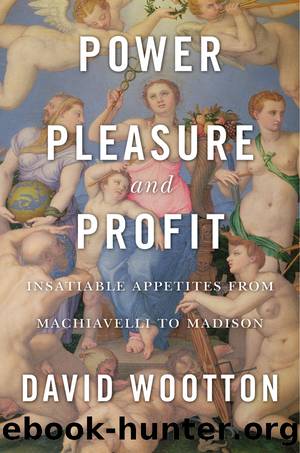Power, Pleasure, and Profit by David Wootton

Author:David Wootton
Language: eng
Format: epub
Publisher: Harvard University Press
Why, if everyone feels sympathy for the starving, do they not come to their assistance? For a very simple reason: famines take place under conditions of uncertainty, and no one can be sure when they will end. Today a stranger dies. Next week a relative or a friend may go hungry. A month later I too may be starving. My own resources are finite. If I help the stranger now, I may be unable to help my friend next week; indeed, I may be unable to help myself next month. And so I feel sympathy and compassion for the suffering of others, but the worse the famine gets, the less likely I am to come to their assistance. Sympathy is all very well, but it will not break a famine once it has got a grip.
In conditions of dearth, though, charity may well serve to prevent hunger from turning into starvation, and may indeed prevent famine from getting a grip. But for the charity of Parson Woodforde and his fellows there would have been famine in Weston Longville in 1795. The reason for this is simple: although in years of bad harvest the amount of food did not fall greatly below the average, prices were much more volatile.51 Smith himself provides figures which show that the price of wheat tripled between 1706 and 1709 and halved between 1740 and 1743.52 Wages for rural workers were set at Michaelmas, just after the main wheat harvest, and long before it was possible to predict just how much prices would rise or fall in the coming year. It was thus perfectly possible for a worker to find that his wages were insufficient to feed a family—yet in his chapter on wages Smith fails to acknowledge this, claiming three times that a floor for wages is set by what he calls “common humanity” (I.viii.16, 24, 28), which is to say that employers intend the wages they pay their employees to be sufficient to keep them (and perhaps also their families) alive. In Smith’s England, in the absence of price controls, charity had a crucial role to play in supplementing wages. In years of bad harvest it was charity, not a living wage, which was the natural expression of “common humanity,” yet charity is never mentioned in Smith’s text.53
Smith, instead, addressed himself to the old moral economy of price controls, not the new moral economy of charity and subsidy. He writes,
Whoever examines, with attention, the history of the dearths and famines which have afflicted any part of Europe, during either the course of the present or that of the two preceding centuries, of several of which we have pretty exact accounts, will find, I believe, that a dearth never has arisen … from any other cause but a real scarcity, occasioned sometimes, perhaps … by the waste of war, but in by far the greatest number of cases, by the fault of the seasons; and that a famine has never arisen from any other cause
Download
This site does not store any files on its server. We only index and link to content provided by other sites. Please contact the content providers to delete copyright contents if any and email us, we'll remove relevant links or contents immediately.
The Secret History by Donna Tartt(19088)
The Social Justice Warrior Handbook by Lisa De Pasquale(12190)
Thirteen Reasons Why by Jay Asher(8909)
This Is How You Lose Her by Junot Diaz(6887)
Weapons of Math Destruction by Cathy O'Neil(6280)
Zero to One by Peter Thiel(5802)
Beartown by Fredrik Backman(5754)
The Myth of the Strong Leader by Archie Brown(5507)
The Fire Next Time by James Baldwin(5445)
How Democracies Die by Steven Levitsky & Daniel Ziblatt(5218)
Promise Me, Dad by Joe Biden(5153)
Stone's Rules by Roger Stone(5088)
A Higher Loyalty: Truth, Lies, and Leadership by James Comey(4964)
100 Deadly Skills by Clint Emerson(4925)
Rise and Kill First by Ronen Bergman(4789)
Secrecy World by Jake Bernstein(4753)
The David Icke Guide to the Global Conspiracy (and how to end it) by David Icke(4719)
The Farm by Tom Rob Smith(4509)
The Doomsday Machine by Daniel Ellsberg(4490)
